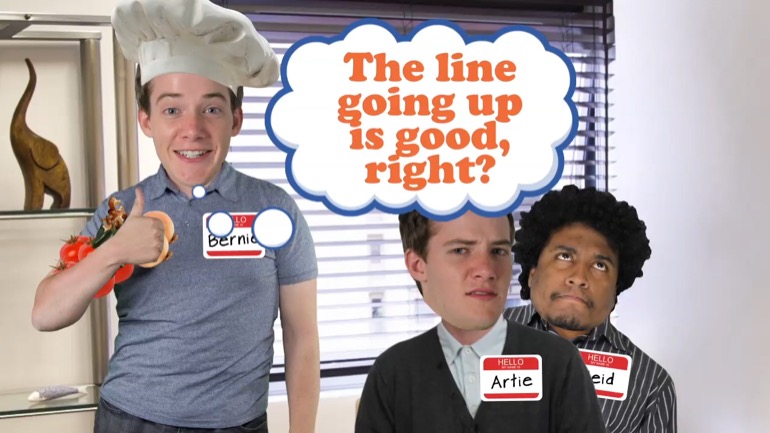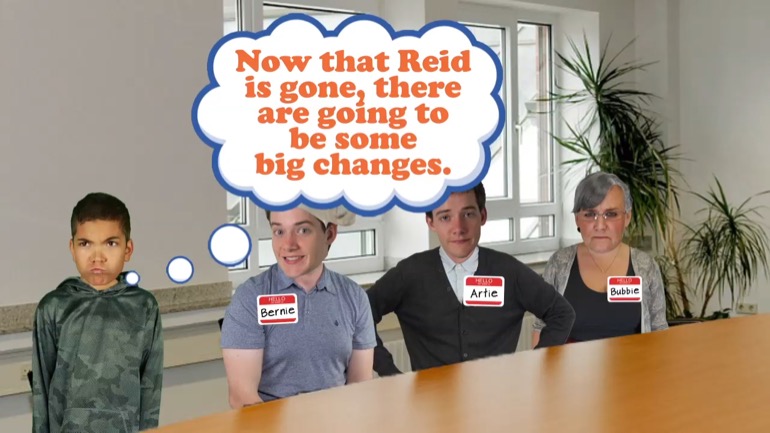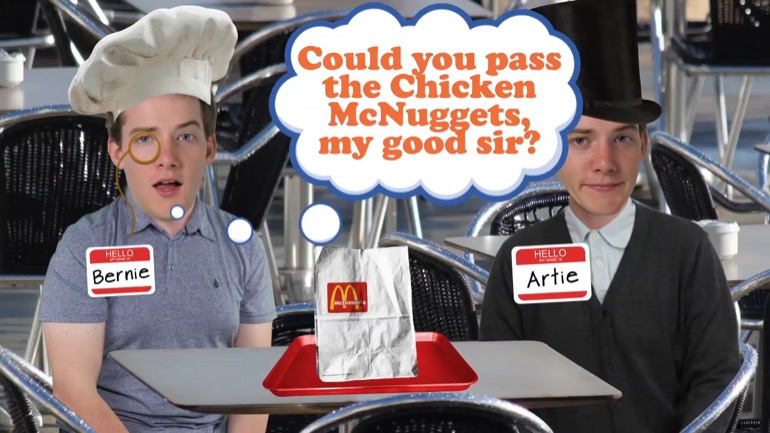ShmoopTube
Where Monty Python meets your 10th grade teacher.
Search Thousands of Shmoop Videos
Financial Responsibility Videos 957 videos
How are risk and reward related? Take more risk, expect more reward. A lottery ticket might be worth a billion dollars, but if the odds are one in...
What is par value? The notional value of a stock or bond before an offering takes place. When a company is started, founders come up with a par val...
Principles of Finance: Unit 1, The Sauce Company 15 Views
Share It!
Description:
Time to revisit the Sauce Company. So let's see what's cookin'. Artie and Bernie, who at one time owned 50% of the company each, have been diluted. Fortunately, the sauce has not suffered the same fate.
Transcript
- 00:00
principles of Finance, a la shmoop. the sauce company -all right let's bring
- 00:07
our attention back to the sauce company. and take a look at their balance sheet.
- 00:11
well as you can see the company's equity at this point looks like this: five [balance sheet pictured]
- 00:16
hundred thousand of preferred stock in a million bucks of common stock. so at
- 00:21
inception Artie and Bernie owned the company fifty-fifty. halfsies. between the
Full Transcript
- 00:26
two of them they own 100% but now each instead of owning 50% owns
- 00:31
33% assuming a you know successful outcome. so the net worth of the company
- 00:37
is now $500,000. it's just the cash. that's the net worth there's a million
- 00:43
dollars of perceived value here though. why? what did Reid buy? well he's a savvy
- 00:49
guy he knows that Artie and Bernie at 21 are not exactly the Michael Jordan of [Bernie, Artie and Reid pictured]
- 00:54
the global scale food distribution. in Reid's mind the million bucks pre-money
- 00:59
valuation he paid for this company was for bubbies secret sauce formula. they
- 01:05
call that the intellectual property or IP of the company. that's where all the
- 01:10
value is at this moment. in a pinch Reid hopes that while he could sell it to one
- 01:15
of the Thousand Islands or Paul Newman or the good folks at Pace. proudly not
- 01:21
from New York City. at this point Artie officially becomes the CFO and CEO of
- 01:26
the company. in a tiny company that's common practice but in anything larger
- 01:31
it's a big no-no. well Reid is looking over their shoulders anyway and he [man folds arms]
- 01:34
explains the balance sheet equation as ale. yeah kind of like the stuff you
- 01:38
drink. assets minus liabilities equals equity. $500,000 in assets which is cash
- 01:45
minus zero dollars in liabilities is $500,000 in equity. confused a bit? all
- 01:50
right let's break this down assets the barbecues- the knowledge how to make the
- 01:55
distinctively semi spicy sauce derived from oil schmaltz and secret recipes. the
- 02:01
brand name, the sauce and well, Bubbie. in more pedantic terms add accounts [top secret file shown]
- 02:06
receivable investments inventory and property both intellectual and physical,
- 02:11
all that, assets. liabilities well right now we have
- 02:15
none. think of liabilities as what do we owe? as the sauce company gets bigger
- 02:20
it'll start buying a lot of raw materials to make the stuff and it'll
- 02:24
have agreements with those suppliers to you know pay them later for the onions
- 02:29
thank you very much. those are called accounts payable. the company might also
- 02:33
raise additional money on a long term basis by borrowing it. and that borrowing
- 02:37
would also be considered a liability. now in theory the preferred shares at Book
- 02:43
value or what they were written down at the book out of five hundred thousand [book value defined]
- 02:46
dollars would be a liability but preferred shares are actually equity.
- 02:51
they convert into common when things go well. and there's no liability on the
- 02:55
company to pay back the five hundred thousand dollars of cash from its
- 02:59
operations. this is kind of a venture capital flavor of preferred stock
- 03:03
different from other types of preferred usually found in public companies. well
- 03:07
don't worry about all that stuff yet what you do have to know is that book
- 03:11
value is what common shareholders would get if the company just died and put
- 03:16
itself on eBay, less the bloated listing fees on eBay. they get a net [head stone pictured]
- 03:21
number whatever the company sold for well preferred shareholders would get
- 03:24
first and whatever is left that would go to the common shareholders. remember more
- 03:28
or less that this number ale assets minus liabilities equals equity. okay? got
- 03:35
it? so that's the equity of the company comes from assets minus liabilities. Book
- 03:39
value is not an assessment of the selling price of the original
- 03:42
handwritten copy of Moby Dick .instead book value usually gets brought into
- 03:46
question for market valuations sake when things have gone horribly wrong and
- 03:51
there really isn't an ongoing enterprise anymore for the business. not a good
- 03:55
thing for investors most of the time, meaning people look at Book value or how
- 03:59
much money the company raised as at least an initial guess for what it's
- 04:03
worth like the cash they raise they bought a bunch of barbecues what do they
- 04:07
work now? oh and don't forget equity. that's the amount of value you have in
- 04:12
asset after subtracting any debts. so as you can see there's a lot more that goes
- 04:17
into the sauce business than meets the eye ,or the mouth. there's the matter of [sauce simmering]
- 04:21
your assets liabilities and overall equity but let's not forget the super
- 04:25
secret sauce recipe Ardie Bernie's grandma is going to get really
- 04:29
angry about them stealing. [man looks fearful]
Related Videos
GED Social Studies 1.1 Civics and Government
What is bankruptcy? Deadbeats who can't pay their bills declare bankruptcy. Either they borrowed too much money, or the business fell apart. They t...
What's a dividend? At will, the board of directors can pay a dividend on common stock. Usually, that payout is some percentage less than 100 of ear...
How are risk and reward related? Take more risk, expect more reward. A lottery ticket might be worth a billion dollars, but if the odds are one in...





































































































